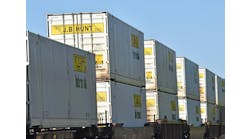Just over 30% of respondents to the 9th semi-annual Freight Pulse Survey conducted by equity research firm Morgan Stanley said they experienced short-term disruptions as a result of hurricanes Katrina and Rita. Much of the problem centered on capacity that was diverted to help with relief efforts. Though this is a short-term effect, it occurred during the peak shipping season.
Shippers responding to the Morgan Stanley survey (including Logistics Today readers) said they perceived capacity in the less-than-truckload (LTL) sector was plentiful. Morgan Stanley reported slightly more capacity in the market than a year earlier. With volume growth slowing overall, LTL rate increases have also slowed.
Truckload capacity is still considered tight, but easing. Carriers have experienced solid growth in revenues and income, but are now seeing factors such as increased fuel costs erode some of their margins.
Those same high fuel prices offer a benefit to rail intermodal. Motor carriers such as J. B. Hunt, which derives over 40% of its operating profit from intermodal, are in line to benefit from the growth of intermodal as freight seeks a more cost effective mode.
Rail pricing has been rising at unprecedented rates and some rail shippers could be in for a shock when their contracts come up for negotiation. Shippers indicated rail rates would increase 5.6% over the next six months, with 34% of shippers reporting their contracts have not come up for repricing in the last 18 months. Most contracts signed before 2004, says the Morgan Stanley report, are priced well below current market rates.


